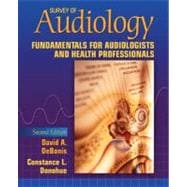
Note: Supplemental materials are not guaranteed with Rental or Used book purchases.
Purchase Benefits
Looking to rent a book? Rent Survey of Audiology Fundamentals for Audiologists and Health Professionals [ISBN: 9780205531950] for the semester, quarter, and short term or search our site for other textbooks by DeBonis, David A.; Donohue, Constance L.. Renting a textbook can save you up to 90% from the cost of buying.
| Each Chapter (excluding Ch 1) conclude with a "Chapter Summary," "Questions for Discussion," "Recommended Reading," and "References" | |
| Preface | |
| Audiology as a Scientific, Collaborative, and Humanistic Discipline | |
| The Audiology Profession | |
| Audiology as a Humanistic Discipline | |
| Recommendations for the Future | |
| References | |
| Acoustics of Sound and Preliminary Clinical Application | |
| What is Sound? | |
| A Word about Units of Measure | |
| Application of Acoustic Concepts to Reading Audiograms and to Understanding the Listening Environment | |
| Fundamental Pathways of Sound | |
| Environmental Acoustics | |
| Anatomy and Physiology of the Auditory System | |
| Anatomy and Physiology of the Peripheral Auditory System | |
| Anatomy and Physiology of the Central Auditory System | |
| Pure Tone Testing | |
| Relationship between Pure Tones and Perception of Speech Sounds | |
| The Audiometer Calibration | |
| Pure Tone Testing | |
| Masking | |
| Some Thoughts on Traditional Test Protocols | |
| Potential Pitfalls in Pure Tone Testing | |
| How to Mask during Pure Tone Testing | |
| Speech Audiometry | |
| Contributions of Speech Audiometry | |
| Speech Audiometry Tests | |
| Other Tests of Speech Understanding | |
| Masking during Speech Audiometry | |
| Other Issues in Speech Audiometry | |
| California Consonant Test | |
| Selected Tests of MAC Battery | |
| How to Mask during Speech Audiometry | |
| Physiological Assessment of the Auditory System | |
| Acoustic Admittance Testing Tympanometry | |
| Eustachian Tube Testing | |
| Acoustic Reflex Thresholds | |
| Otoacoustic Emissions | |
| Auditory Evoked Potentials | |
| Answers to Tympanogram Cases 1-4 | |
| Disorders of the Auditory System | |
| Selected Conditions that May Affect the Outer Ear | |
| Selected Conditions that May Affect the Middle Ear | |
| Selected Conditions that May Affect the Inner Ear | |
| Selected Conditions that May Affect the Central Auditory System | |
| Balance Disorders: Assessment and Management | |
| Pediatric Audiology | |
| Auditory Development and Pediatric Audiology | |
| Components of Auditory System Development | |
| General Principles of Pediatric Audiological Assessment | |
| Client-Specific Protocols for Audiological Assessment of Young Children | |
| Current Issues in Pediatric Audiology | |
| Suggestions for Parents of Children with Middle Ear Problems | |
| Screening Instruments for Targeting Educational Risk (SIFTER) | |
| Assessment and Management of Special Populations | |
| The Elderly | |
| Individuals who are Deaf | |
| Adults with Developmental Disabilities | |
| People with Neurogenic Disorders | |
| Individuals with Nonorganic Hearing Loss | |
| Considerations for Hearing Assessment and Case Management of Individuals Who Have Developmental Disabilities | |
| Communication Strategies for Use with Individuals with Developmental Disabilities | |
| Auditory Processing Disorders | |
| Maturation and Plasticity of the Central Auditory System | |
| Nature and Development of Tests of Auditory Processing | |
| When Is a Referral for Assessment of Auditory Processing Appropriate? | |
| Peripheral Audiological Assessment and Candidacy for Tests of Auditory Processing | |
| Auditory Processing Assessment and Implications for Management | |
| Final Remarks: Auditory Processing as a Useful Construct | |
| Sample Case History Form for Auditory Processing Evaluation | |
| Screening | |
| Definition and Models | |
| Decisions about the Screening | |
| Protocols | |
| General Screening Components | |
| Screening Protocols across the Lifespan | |
| Sample | |
| Table of Contents provided by Publisher. All Rights Reserved. |
The New copy of this book will include any supplemental materials advertised. Please check the title of the book to determine if it should include any access cards, study guides, lab manuals, CDs, etc.
The Used, Rental and eBook copies of this book are not guaranteed to include any supplemental materials. Typically, only the book itself is included. This is true even if the title states it includes any access cards, study guides, lab manuals, CDs, etc.